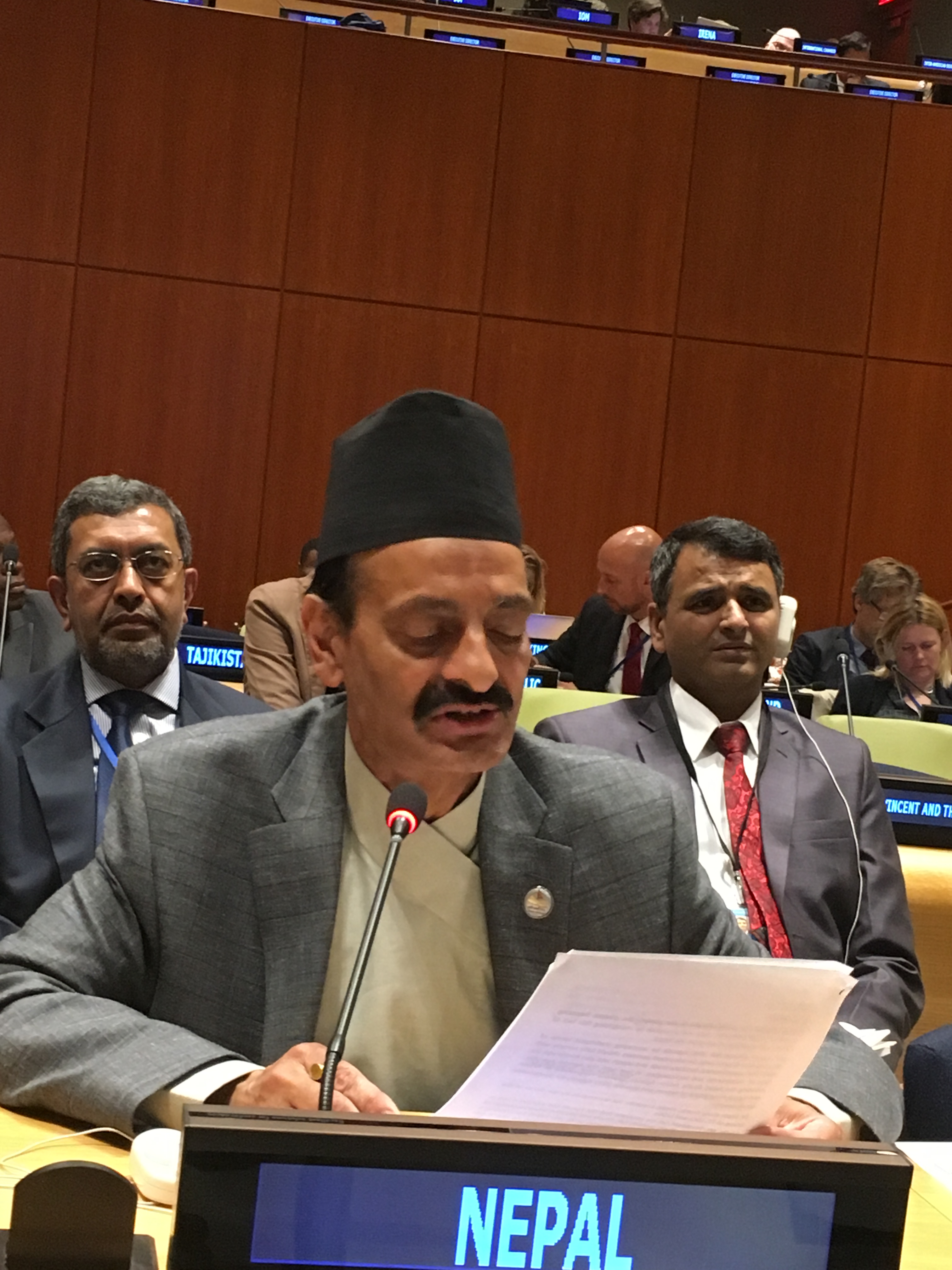Statement by Hon. Nabindra Raj Joshi, Minister for Industry and the Leader of Nepali delegation to the 2017 ECOSOC Forum on Financing for Development Follow-up
New York (22 May 2017)
As delivered
Mr. President,
Honorable Ministers, Excellencies
Distinguished Delegates,
Ladies and Gentlemen,
Let me first commend your leadership, Mr. President, in the preparation for and convening of this important second ECOSOC Forum on Financing for Development follow-up leading to the adoption of its outcome document.
As a land-locked, mountainous and least developed country emerging from conflict, and from the devastating earthquakes of 2015, Nepal pins great hope and confidence on this Forum, as it is the right place to address challenges of the countries like mine. In the context that we have already startedthepost-earthquake reconstruction works and have also integrated the SDGs and its targets well into our mainstream national plans and policies, one issue looms large: financing gap for the implementation of SDGs. And it is even more alarming that it is almost already two years since we adopted the Addis Ababa Action Agenda.
The new constitution adopted by the constituent assembly of Nepal incorporating universally accepted democratic and inclusive values and norms, would help create conducive environment for implementation of all internationally agreed development agendas. Now the focus of all the political parties and of the nation is on the economic and social development.
Nepal’s goal to graduate from the LDC status by 2022 needs huge additional investments to achieve the minimum sustained growth. Similarly, the country aims to emerge as an inclusive, equitable, and prosperous middle-income country by 2030. There are challenges before us, which I wish to highlight here briefly:
Nepal, like many other LDCs and LLDCs, continues to face multiple structural challenges and constraints to development and as a result has undergone an unfairly long struggle for development. Without a structural transformation that tackles institutional, financing and capacity constraints, we will continue to remain vulnerable to various economic, social, and environmental shocks.
The private sector has played a key role in the development process as a whole, including in economic growth, employment creation and revenue generation. We have taken every effort to creating an enabling environment for the private sector. To mobilize more private and public resources and to invite more investments from our own people and foreign investors, Nepal recently organized an investment summit in Kathmandu where commitments to the tune of USD 14 billion was expressed. Similarly, we also organized summits on infrastructure and energy.
Mr. President,
We have realized that to sustain prosperity for a country like ours, domestic resources should account for a large part of the financing for development. We have widened our tax base by formalizing the informal sectors; and have also taken various initiatives such as Special Economic Zones to promote investment and entrepreneurship. Likewise, the Government of Nepal is also committed to modernizing the tax regime and administration and strengthening the capacity to fight money laundering.
The country is getting a substantial remittance inflows from Nepali migrant workers. The Government is committed to creating an environment for productive use of remittancesthrough various institutional mechanisms and financial literacy.
Mr. President,
Climate change has posed threats to our planet. The climate financing should be made adequate, easy and accessible by recognizing this fact of climate vulnerabilities of countries like Nepal.
We cannot achieve the 2030 Agenda by increasing traditional forms of development finance only. Development partners should fully comply with their ODA commitments, facilitate trade and export and also encourage the flow of investments and technologies, in line with the agreed agendas, including the Addis Ababa Action Agenda, Istanbul Programme of Action and Vienna Programme of Action, and also the 2030 Agenda for Sustainable Development.
On these many fronts, Nepal supports the statements by the chairs of the Group of 77, LDCs and LLDCs.
Lastly, Mr. President, let me reiterate that the Forum has a broad scope in streamlining our efforts towards full, timely and effective implementation of the 2030 Agenda. This, of course, requires us to join hands for creating a momentum to attain our goals with a view to ensure that no one is left behind. For this to happen, the international community needs to redouble our efforts to translate the commitments into actions. Nepal is committed to do its part.
Thank you!

